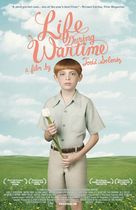Reviews provided by RottenTomatoes
Amy Nicholson, I.E. Weekly: Solondz sees life as misery and actors as instruments. In his hands, they're pianissimo, vibrato, fortissimo -- and never in harmony. Read more
Michael Phillips, At the Movies: I can't stand the moral universe that we're dealing with here. Read more
A.O. Scott, New York Times: Mr. Solondz exaggerates in the direction of mockery, yes, but his lurid colors, emphatic musical effects and dead-center framing also betray a commitment to melodrama that can only be sincere. Read more
Joshua Rothkopf, Time Out: Life During Wartime slices deeply into its characters' weaknesses...But also in evidence is an unlikely vein of forgiveness (or maybe it's oblivion). Read more
David Edelstein, New York Magazine/Vulture: Solondz conjures a world that's rotting away from the inside, in which only the children -- freckle-faced Dylan Riley Snyder and Emma Hinz -- weep over the loss of moral authority. Read more
John Anderson, Wall Street Journal: Derives its blackly comedic bite from being both tragic and immediate. Read more
Michael Upchurch, Seattle Times: Solondz, through the troubled voice of 13-year-old Timmy, does rigorous justice to the difficulties of forgiving and/or forgetting. Read more
Keith Phipps, AV Club: In retrospect, Todd Solondz probably should have hung it up after Happiness. Read more
Ty Burr, Boston Globe: At times, it makes you realize Solondz may be the closest heir we'll get to Robert Bresson, the French filmmaker of human despair and mysterious grace. Read more
J. R. Jones, Chicago Reader: I'd never have predicted something this mediocre. Read more
Peter Rainer, Christian Science Monitor: Not having been a big admirer of Happiness, I don't see the vast achievement in bringing that movie up to date, but a few of the performances and sequences resonate. Read more
Tom Long, Detroit News: The question is: Who wants to watch these people? Read more
Lisa Schwarzbaum, Entertainment Weekly: In a staring contest with his audience, Solondz never blinks. He picks and picks at the themes that consume him, and he doesn't care who stays and who leaves. Me, I'm rapt. Read more
Betsy Sharkey, Los Angeles Times: A taut and tantalizing mix of salty bites and lazy blanks... Read more
Rene Rodriguez, Miami Herald: Life During Wartime, which feels like a movie made to fulfill a contractual obligation, says nothing new, nothing that Happiness didn't already say, only better. Read more
Anthony Lane, New Yorker: [Solondz'] best to date... Read more
Lou Lumenick, New York Post: While it obviously isn't for all tastes, this is a big, thematically rich step forward -- mostly it's about tolerance and forgiveness -- from the empty provocation of Solondz's Storytelling and Palindromes. About time. Read more
Rex Reed, New York Observer: There's no arc here, no real pathos, and the direction is like watching snow melt on the side of a road. Read more
Carrie Rickey, Philadelphia Inquirer: Lachman and Solondz have a gift for finding the extraordinary in the ordinary and that ray of hope amid the hopelessness. Read more
James Berardinelli, ReelViews: Life During Wartime relies on uncomfortable black humor and moments of sincere drama to involve viewers. But everything is encased in artifice and the movie becomes a chore to take in. Read more
Roger Ebert, Chicago Sun-Times: This is the Solondz world. I think he's a brilliant filmmaker. Read more
Mick LaSalle, San Francisco Chronicle: Todd Solondz keeps attempting the impossible and deserves credit for trying. Read more
Colin Covert, Minneapolis Star Tribune: Solondz treats his characters with all the compassion of a child frying ants with a magnifying glass. Read more
Joe Williams, St. Louis Post-Dispatch: The daring director is still a fascinating craftsman, but now we don't feel welcome in his dollhouse. Read more
Stephen Cole, Globe and Mail: For all of Solondz's mischief, we sense he likes his unhelpable characters, and that they maybe like each other. A little bit, anyway. Read more
Geoff Pevere, Toronto Star: An easy film to dislike, a piece of cake to admire and all but impossible to love. But I think that's part of the intent. Read more
Ben Walters, Time Out: Solondz's ongoing interests ... ensure some shocks but his underlying interests are sincere and humane: the consequences of trauma, the capacity for self-delusion, the possibility of change and the necessity of forgiveness. Read more
Todd McCarthy, Variety: Winning result, which reels off one riveting scene after another, stands as both a unique sort-of sequel and a film that requires no prior reference points; it's entirely satisfying either way, though even richer if you recall the antecedent. Read more
J. Hoberman, Village Voice: Daring the discomfited viewer to laugh at shame and suffering, and then wonder why we're laughing, Todd Solondz is back. Read more
Christy Lemire, Associated Press: There's repetitious talk about forgiving and forgetting, and debate over which is preferable, but Solondz doesn't seem particularly interested in either. Read more
Ann Hornaday, Washington Post: [Solondz] seems mired in simply rehearsing his characters' most fatal flaws. Read more

